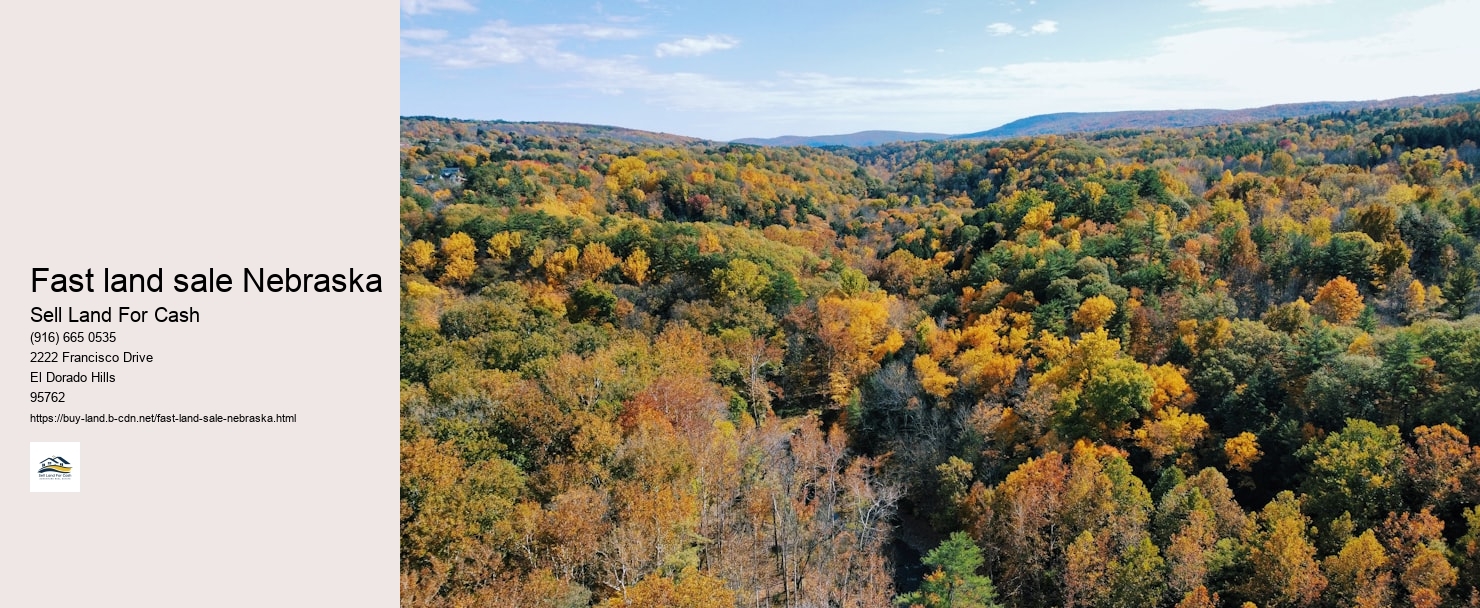

When selling Nebraska land for cash, there are several important steps to consider in order to ensure a smooth and successful transaction.
Research the Market: Before putting your Nebraska land up for sale, it is crucial to research the current market conditions. This includes understanding the demand for land in your specific area, as well as recent sales prices of comparable properties. By having a solid grasp of the market, you can set a realistic asking price and attract potential buyers more effectively.
Improve the Property: In order to maximize the value of your Nebraska land and appeal to potential buyers, consider making improvements to the property. This could include clearing brush or debris, installing fencing or gates, or addressing any environmental concerns. By presenting a well-maintained property, you can increase its desirability and ultimately sell it for a higher price.
Market Effectively: Once you have researched the market and made any necessary improvements to your Nebraska land, it is time to start marketing it effectively. Consider listing your property on online real estate platforms, working with local real estate agents, and utilizing social media to reach a wider audience of potential buyers. The more exposure your property receives, the better chance you have of finding a buyer quickly.
Negotiate and Close the Deal: After attracting interested buyers for your Nebraska land, be prepared to negotiate offers and terms of sale. It is important to remain flexible during this process in order to reach an agreement that satisfies both parties. Once an offer has been accepted, work with a reputable title company or attorney to ensure all legal requirements are met before closing the deal and receiving cash payment for your land.
When it comes to selling your Nebraska land for cash, finding reputable buyers is crucial. Here are some tips to help you identify trustworthy buyers who will offer fair prices for your property.
Research local real estate agencies: Start by researching local real estate agencies in Nebraska that specialize in buying land. Look for agencies with a proven track record of successful transactions and positive reviews from previous clients.
Utilize online platforms: In addition to traditional real estate agencies, you can also utilize online platforms such as LandWatch or Zillow to list your property and attract potential buyers. These platforms allow you to reach a wider audience and connect with serious investors looking to purchase land in Nebraska.
Network within the industry: Networking within the real estate industry can also help you find reputable buyers for your Nebraska land. Attend local networking events, join online forums, and connect with professionals in the field who may have leads on interested buyers.
Consider hiring a land broker: If you're having trouble finding reputable buyers on your own, consider hiring a land broker to help facilitate the sale. A professional land broker will have experience negotiating deals, conducting due diligence, and ensuring a smooth transaction process.
Verify buyer credentials: Before entering into any agreements with potential buyers, be sure to verify their credentials and conduct background checks if necessary. Look for buyers with a solid financial standing and a history of successful land acquisitions.
Get multiple offers: To ensure you're getting the best deal possible for your Nebraska land, try to get multiple offers from different buyers. This will give you leverage during negotiations and help you choose the most reputable buyer who meets your requirements.
Nebraska (/nəˈbræskə/ ⓘ nə-BRASS-kə) is a landlocked state in the Midwestern region of the United States. It borders South Dakota to the north; Iowa to the east and Missouri to the southeast, both across the Missouri River; Kansas to the south; Colorado to the southwest; and Wyoming to the west. Nebraska is the 16th-largest state by land area, with just over 77,220 square miles (200,000 km2). With a population of over 1.9 million, it is the 38th-most populous state and the eighth-least densely populated. Its capital is Lincoln, and its most populous city is Omaha, which is on the Missouri River. Nebraska was admitted into the United States in 1867, two years after the end of the American Civil War. The Nebraska Legislature is unlike any other American legislature in that it is unicameral, and its members are elected without any official reference to political party affiliation. Nebraska is one of only two states that divide electoral college votes by district, and is not winner-take-all.
Nebraska is composed of two major land regions: the Dissected Till Plains and the Great Plains. The Dissected Till Plains region consists of gently rolling hills and contains the state's largest cities, Omaha and Lincoln. The Great Plains region, occupying most of western Nebraska, is characterized by treeless prairie. Eastern Nebraska has a humid continental climate while western Nebraska is primarily semi-arid. The state has wide variations between winter and summer temperatures; the variations decrease in southern Nebraska. Violent thunderstorms and tornadoes occur primarily during spring and summer, and sometimes in autumn. The Chinook wind tends to warm the state significantly in the winter and early spring.
Indigenous peoples, including Omaha, Missouria, Ponca, Pawnee, Otoe, and various branches of the Lakota (Sioux) tribes, lived in the region for thousands of years before European discovery and exploration. The state is crossed by many historic trails, including that of the Lewis and Clark Expedition. The completion of the Transcontinental Railroad through Nebraska and passage of the Homestead Acts led to rapid growth in the population of American settlers in the 1870s and 1880s and the development of a large agriculture sector for which the state is known to this day.

Selling land in Nebraska quickly and for cash can be a straightforward process if approached with strategy and preparation.. While the task may seem daunting, especially when aiming for a quick sale, understanding the nuances of the land market, leveraging technology, and positioning your property attractively can make all the difference.
Posted by on 2024-09-30

Selling land in Nebraska for immediate cash offers is a process that requires careful consideration, strategic planning, and a clear understanding of the local real estate market.. Nebraska, with its vast expanses of farmland, rolling hills, and scenic landscapes, presents unique opportunities and challenges for landowners looking to sell quickly for cash.
Posted by on 2024-09-30

Turning your Nebraska land into cash can seem like a daunting task, yet with the right approach and understanding of the process, it can be a rewarding endeavor.. Whether you inherited a parcel of land or purchased it as an investment, selling rural property involves several steps that require careful consideration.
Posted by on 2024-09-30

Selling land in Nebraska can be a lucrative endeavor, but like any real estate transaction, it requires strategy and understanding of the market.. To maximize cash returns from selling Nebraska land, one must consider several factors that influence both buyers' interests and the property's value.
Posted by on 2023-09-30
When considering selling Nebraska land for cash, it is essential to have an understanding of the current market value. Several factors can influence the price of land in Nebraska, including location, size, soil quality, and potential for development.
Location plays a significant role in determining the market value of Nebraska land for a cash sale. Land located near urban areas or with easy access to highways tends to have higher value compared to rural land. Additionally, proximity to amenities such as schools, shopping centers, and hospitals can also impact the price.
Size is another crucial factor when determining the market value of Nebraska land. Larger parcels of land are generally more valuable than smaller ones due to their potential for agricultural production or development. However, the demand for smaller parcels for residential purposes can also drive up prices in certain areas.
Soil quality is a key consideration when assessing the market value of Nebraska land. Land with fertile soil suitable for farming or ranching commands higher prices compared to land with poor quality soil. Farmers and investors are willing to pay a premium for land that can yield high crop yields or support livestock grazing.
The potential for development can significantly increase the market value of Nebraska land for a cash sale. Land zoned for residential, commercial, or industrial use is typically more valuable than agricultural land. Investors looking to develop properties may be willing to pay top dollar for land with development potential.
It is important to conduct thorough research and seek professional guidance when determining the market value of Nebraska land for a cash sale. Real estate agents, appraisers, and agricultural experts can provide valuable insights into local market trends and help sellers set a competitive asking price.
Ultimately, the market value of Nebraska land for a cash sale will depend on various factors unique to each property. By carefully evaluating location, size, soil quality, development potential, and seeking expert advice sellers can maximize their returns and attract potential buyers looking to invest in Nebraska real estate.


One effective way to find buyers interested in purchasing Nebraska land for cash is by utilizing online platforms such as real estate websites and social media. These platforms allow you to reach a wide audience of potential buyers who are actively searching for properties.
Utilize Real Estate Websites: Utilize popular real estate websites such as Zillow, Realtor.com, and LandWatch to list your Nebraska land for sale. These websites attract a large number of buyers looking for properties, making it easier for you to connect with interested parties.
Engage with Social Media: Use social media platforms like Facebook, Instagram, and LinkedIn to promote your Nebraska land for sale. Create engaging posts with photos and detailed descriptions of the property to attract potential buyers. You can also join local real estate groups on these platforms to network with other industry professionals and reach more potential buyers.
Collaborate with Local Real Estate Agents: Consider partnering with local real estate agents who specialize in selling land in Nebraska. They have the expertise and connections to help you find qualified buyers quickly. Real estate agents can also assist with pricing your property competitively and negotiating offers on your behalf.
Attend Real Estate Events and Networking Opportunities: Attend local real estate events, conferences, and networking opportunities to meet potential buyers interested in purchasing Nebraska land. These events provide a great platform to showcase your property and connect with serious investors looking to buy land for cash.
Advertise in Local Publications: Place advertisements in local newspapers, magazines, and newsletters that cater to real estate investors or property buyers. This traditional marketing approach can help you reach a targeted audience of individuals interested in buying land in Nebraska.
Utilize Direct Mail Campaigns: Consider sending direct mail campaigns to targeted mailing lists of individuals who may be interested in purchasing land in Nebraska. Include information about your property along with contact details so that interested buyers can easily get in touch with you.
Offer Incentives or Discounts: To attract more buyers interested in purchasing Nebraska land for cash, consider offering incentives such as discounts on the purchase price or covering closing costs. These incentives can make your property more attractive compared to others on the market.
When selling Nebraska land for cash, there are several legal documents that are required to ensure a smooth and legally-binding transaction.
Purchase Agreement: A purchase agreement is a legally binding contract between the buyer and seller outlining the terms and conditions of the sale. This document typically includes details such as the purchase price, closing date, earnest money deposit, and any contingencies.
Deed: The deed is a legal document that transfers ownership of the property from the seller to the buyer. In Nebraska, a warranty deed is commonly used in real estate transactions to guarantee that the seller has clear title to the property and has the right to sell it.
Title Search: A title search is conducted to verify that the seller has clear title to the property and can legally transfer ownership. This process involves searching public records for any liens, judgments, or other encumbrances that could affect the sale.
Closing Statement: A closing statement, also known as a settlement statement or HUD-1 form, outlines all of the financial details of the transaction. This document includes information on closing costs, prorated taxes, loan payoffs, and other expenses related to the sale.
Bill of Sale: A bill of sale is a legal document that transfers personal property from one party to another. In some cases, a bill of sale may be required if there are any personal property items included in the sale of land.
Seller's Disclosure Statement: In Nebraska, sellers are required to provide buyers with a disclosure statement detailing any known defects or issues with the property. This document helps protect buyers from purchasing a property with undisclosed problems.


When selling Nebraska land for cash, there are several potential tax implications to consider. It is important to understand how the sale will impact your tax liability and plan accordingly.
Capital Gains Tax One of the main tax implications of selling Nebraska land for cash is the capital gains tax. If you have owned the land for more than one year, any profit from the sale will be subject to this tax. The rate of capital gains tax depends on your income level and whether the land was classified as a short-term or long-term investment.
1031 Exchange If you are looking to defer paying capital gains taxes on the sale of Nebraska land, you may want to consider a 1031 exchange. This allows you to reinvest the proceeds from the sale into a similar property within a certain timeframe, typically 180 days. By doing so, you can defer paying taxes on any capital gains until you sell the new property.
Depreciation Recapture If you have claimed depreciation on the Nebraska land in previous years, you may be subject to depreciation recapture upon its sale. This means that any depreciation deductions you took will be added back to your taxable income when calculating your capital gains tax.
State Taxes In addition to federal taxes, it is important to consider state taxes when selling Nebraska land for cash. Depending on where you reside and where the land is located, you may owe state income taxes on any profits from the sale.
Estate Taxes If you are selling Nebraska land as part of an inheritance or estate settlement, there may be estate tax implications to consider. It is advisable to consult with a tax professional or estate planning attorney to understand how these taxes may impact your situation.
Consultation with Tax Professional Given the complex nature of taxation laws and regulations surrounding real estate transactions, it is highly recommended that individuals consult with a qualified tax professional before selling Nebraska land for cash. They can provide guidance on minimizing tax liabilities and maximizing financial benefits from the sale.
First, consider the market conditions. It is important to research the current real estate market in Nebraska to determine if it is a favorable time to sell land for cash. Factors such as demand, supply, interest rates, and economic indicators can all influence the selling price of land.
Next, assess the value of the land. Before deciding to sell Nebraska land for cash, it is crucial to determine its worth. Consider factors such as location, size, zoning regulations, access to utilities, and any potential for development. Consulting with a real estate appraiser or agent can help provide insight into the value of the land.
Evaluate your financial goals and needs. Selling land for cash can provide a quick influx of money, but it is essential to consider how this aligns with your overall financial objectives. Determine if selling the land aligns with your short-term and long-term financial goals.
Consider tax implications. Selling Nebraska land for cash may have tax consequences that need to be taken into account. Consult with a tax professional to understand how selling the land will impact your tax liability and any potential deductions or exemptions available.
Assess any emotional attachment to the land. Land often holds sentimental value for many individuals and families. Before deciding to sell Nebraska land for cash, take into consideration any emotional attachment you may have towards the property and how selling it may impact you personally.
Lastly, explore alternative options. Selling Nebraska land for cash is not the only option available when looking to liquidate assets. Consider other alternatives such as leasing the land, entering into a joint venture agreement, or exploring financing options before making a final decision on selling for cash.

You must ensure all documents are correct, disclose any known environmental issues, and comply with local laws regarding property transfers.
Selling outright typically involves direct payments but offering seller financing may attract different buyer pools willing to pay higher values over time.
Provide requested information promptly such as surveys or soil tests while ensuring sensitive data is protected during negotiations.